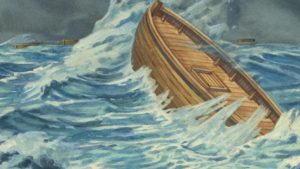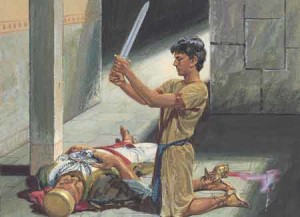Lately, Facebook has become a source of terror for me as each new day is filled with people who have moved on from being single to married and now to having babies. The latest in this parade of everyone else’s accomplishments was the announcement that my high school boyfriend and his wife are expecting their first child. He’s the kind of person who only pops into Facebook to post about major life events. Although I’m sure this isn’t his intention, sometimes I feel that it sends a message of “I live a life that is so full that I only get on Facebook to tell everyone how great it’s going.”
 I, however, am on the opposite end of the spectrum. I couldn’t even bring myself to post about my graduation from college because it didn’t seem as important as people getting married or having babies. I just lurk around watching everyone else’s lives fill up with marriage and family. It’s definitely not healthy, but that’s not what this article is about. I’m just explaining the impetus behind the spiral that prompted me to write this article.
I, however, am on the opposite end of the spectrum. I couldn’t even bring myself to post about my graduation from college because it didn’t seem as important as people getting married or having babies. I just lurk around watching everyone else’s lives fill up with marriage and family. It’s definitely not healthy, but that’s not what this article is about. I’m just explaining the impetus behind the spiral that prompted me to write this article.
In the scriptures, we get stories of people who needed to trust God and move forward in order to accomplish His purposes. Too often we focus on the outcome of these stories and forget what happens in the middle. We can’t neglect the middle because that’s where most of us are. We find ourselves in the middle of the struggle.
Nephi and Laban
One example of being in the middle comes from Nephi. In 1 Nephi 3, Lehi tells Nephi that the Lord has commanded them to get the plates from Laban, and Nephi says that classic line: “And it came to pass that I, Nephi, said unto my father: I will go and do the things which the Lord hath commanded, for I know that the Lord giveth no commandments unto the children of men, save he shall prepare a way for them that they may accomplish the thing which he commandeth them.” (1 Nephi 3:7).
Nephi has just come from this experience where he has gained a testimony of everything his father has been teaching. He’s excited and he’s ready to do what the Lord has asked them to do. Through the struggles that Nephi and his brothers experienced trying to get the plates, Nephi’s unflagging faith carried him . Finally, when everything else failed, Nephi chose to put his faith in God again and he “was led by the Spirit, not knowing beforehand the things which [he] should do” (1 Nephi 4:6).
Nephi is enthusiastic and he’s willing to trust implicitly until the Spirit directs him to do something he never thought he would have to do. The Spirit tells Nephi to kill Laban, and Nephi writes, “And I shrunk and would that I might not slay him” (1 Nephi 4:10). Nephi knows that God will provide a way for him to obtain the plates, but when that way is shown to him, he hesitates. In that hesitation, we see Nephi’s struggle to put his trust in the Lord. Nephi cannot see the outcome in that moment, but God is merciful and helps Nephi understand why he needs to kill Laban.
We’ve all been in a situation where we’re willing to trust God as we move forward in life only to hesitate when we find out the way God wants us to go. We get to our metaphorical Laban and we look up at God and say, “I’m willing to trust, but please let it be any way but the way that you’ve given me.” In those moments, I like to think He takes us by the hand and shows us, like He did Nephi, just enough to understand and move forward. Trusting God doesn’t mean that we don’t have our doubts and fears — it means we keep moving forward in spite of those fears.
The Jaredites and the Barge
 Another example later in the Book of Mormon is the Jaredites. The Jaredites left their home and traveled in the wilderness to get to the promised land. They reached the seashore and they stayed there for four years until the Lord commanded the Brother of Jared to build barges to cross the sea. The barges were like “…a whale in the midst of the sea” (Ether 2:24). The Jaredites didn’t entirely know what the journey would be like, but they did know that they would be underwater much of the time. They had to trust that the Lord would help them arrive in the promised land.
Another example later in the Book of Mormon is the Jaredites. The Jaredites left their home and traveled in the wilderness to get to the promised land. They reached the seashore and they stayed there for four years until the Lord commanded the Brother of Jared to build barges to cross the sea. The barges were like “…a whale in the midst of the sea” (Ether 2:24). The Jaredites didn’t entirely know what the journey would be like, but they did know that they would be underwater much of the time. They had to trust that the Lord would help them arrive in the promised land.
About being underwater, the Lord told them, “…the mountain waves shall dash upon you. Nevertheless, I will bring you up again out of the depths of the sea; for the winds have gone forth out of my mouth, and also the rains and the floods have I sent forth. And behold, I prepare you against these things; for ye cannot cross this great deep save I prepare you against the waves of the sea, and the winds which have gone forth, and the floods which shall come . . .” (Ether 2:24-25). The winds and the waves that would beat on their barges and make their journey difficult and frightening were also the force that would push them forward to the promised land. They had to trust that the winds and waves would help them rather than hurt them.
My Experience Struggling with a Missionary Companion
In the middle of our most difficult circumstances, we have to believe that the Lord will “…consecrate [our] afflictions for [our] gain“ (2 Nephi 2:2). We have to trust that Heavenly Father will prepare us for those difficulties. On my mission, I had a difficult companion with whom I really struggled. I felt like I was trapped in a barge with one of the most toxic people I’ve ever met and I felt fully at the mercy of the winds and the waves.
 At that time, I remembered the words of Robert Frost: “I can see no way out but through.” We didn’t become friends. I didn’t help her change. I silently sobbed every Monday in my little internet cubicle as I read encouraging words from my parents. Every morning, I prayed for the strength to crawl through another day. This story does not have an Ensign ending. I endured a transfer with her and then she moved on to a new area.
At that time, I remembered the words of Robert Frost: “I can see no way out but through.” We didn’t become friends. I didn’t help her change. I silently sobbed every Monday in my little internet cubicle as I read encouraging words from my parents. Every morning, I prayed for the strength to crawl through another day. This story does not have an Ensign ending. I endured a transfer with her and then she moved on to a new area.
A few years of perspective have helped me understand, to some extent, why I had her as a companion. While it was very difficult, she was the wind and waves that pushed me forward to prepare me for other assignments I would have in the mission. Being her companion forced me to lean on the people around me—my family, friends, other missionaries, my mission president—which I otherwise would not have done. Even more, it forced me to lean on Jesus and trust that I could make it through by relying on His love and grace. I realized that when things are difficult in my little barge, I still have the light of Jesus, just like the Jaredites had the small stones that Jesus touched with His finger. In my little barge, I have to trust that the light will be enough to help me weather the wind and the waves.
Joseph Smith and the Lost Manuscript
During that time with my difficult companion, I read Doctrine and Covenants 3 frequently. This section was given to Joseph Smith after Martin Harris lost the 116 pages of the manuscript for the translation of the Book of Mormon. Consequently, the Lord took the plates from Joseph. This period of time was already very difficult for Joseph. His wife, Emma, had been pregnant with their first child, but the baby did not live long after birth.
Joseph was grieving and taking care of Emma as she was recovering. Then Martin Harris told him that the 116 were lost. He was in the middle of one of the worst times of his life and he had to trust that all was not lost. By giving Martin Harris the 116 pages despite God’s initial repudiation, Joseph failed to trust that the Lord’s way was better than his way, and God allowed him to learn from that experience. After Joseph goes through a period of repentance, the Lord speaks to him saying, “The works, and the designs, and the purposes of God cannot be frustrated, neither can they come to naught” (D&C 3:1).
I keep going back to Doctrine and Covenants 3 even now because it reminds me that God has a plan. He knew that the 116 pages were going to be lost and He had prepared for that. In 1 Nephi 9, Nephi writes, “Wherefore, the Lord hath commanded me to make these plates for a wise purpose in him, which purpose I know not. But the Lord knoweth all things from the beginning; wherefore he prepareth a way to accomplish all his works among the children of men; for behold, he hath all power unto the fulfilling of all his words…” (1 Nephi 9:5-6). Nephi didn’t know why he had been commanded to make a second set of plates, but he trusted the Lord and made them.
Applying Trust as a Latter-day Saint Single
I’m in my mid-twenties and I’m still single. The fact that I’m still relatively young doesn’t change the fact that most of my friends are married and have children. I’m at a point in my life where I see everyone passing me and heading on to bigger and better things in life. Meanwhile, I’m in the middle like Nephi, the Jaredites, or Joseph Smith. I’ve been promised a lot of things in my patriarchal blessing and in other blessings I’ve received—promises I’ve yet to see fulfilled.

To read more of Elisha’s articles, click here.
I’ve moved forward and made something of my life. I’ve done my best to live instead of waiting for my life to start. In spite of my efforts to keep my chin up and hope for the best, being single gnaws at me constantly. It’s an ache in my soul that nothing has assuaged. I struggle to trust that everything will turn out fine, so I turn to Doctrine and Covenants 3 to remember that “…God doth not walk in crooked paths, neither doth he turn to the right hand nor to the left, neither doth he vary from that which he hath said, therefore his paths are straight, and his course is one eternal round” (D&C 3:2).
Heavenly Father has told me—and all of us—that He keeps his promises. One of the major themes of the Book of Mormon is that He remembers His people. I am not forgotten or left behind to Him. He will keep His promises, and all He asks is that I trust Him. He asks for my trust when I am asked to move forward without knowing what comes next. He asks for my trust when I am blown about by the winds and the waves of uncertainty. He asks for my trust when I cannot see the way in which He plans to accomplish His purposes. In the middle of everything, I hold onto the assurance that He truly does keep all His promises and I keep moving forward.
Additional Readings:
About Elisha Ransom
Elisha Ransom is a Pacific Northwest native who recently graduated from Brigham Young University. Sight unseen, she moved to a 600-square foot apartment in Portland, OR to pursue a master's degree in urban planning. She is still trying to figure out a way to explain what urban planning is to people she talks to at parties.
Elisha served a mission for The Church of Jesus Christ of Latter-day Saints in Piura, Peru. Consequently, she has an affinity for Peruvian food and crowded public transit. In her spare time, Elisha enjoys watching the Great British Bake Off, eating tacos, and doing the New York Times crossword puzzle—these can be separate or combined activities.
Twitter •









“The winds and the waves that would beat on their barges and make their journey difficult and frightening were also the force that would push them forward to the promised land. They had to trust that the winds and waves would help them rather than hurt them.” I am empowered by your words and the examples you shared in the scriptures! Thank you so much for sharing your experiences and findings.
Thank you, Jess! I think my favorite part in thinking about the story of the Jaredites is when the Lord says “…for the winds have gone forth out of my mouth, and also the rains and the floods have I sent forth…” He reminds the brother of Jared that He created the winds and the rains and they come from Him. Heavenly Father sends us the things that we need to move forward. They may not necessarily be the things that we want but they are what we need to progress. It always helps me to remember that whatever winds and waves I encounter will help me to get where I’m going.